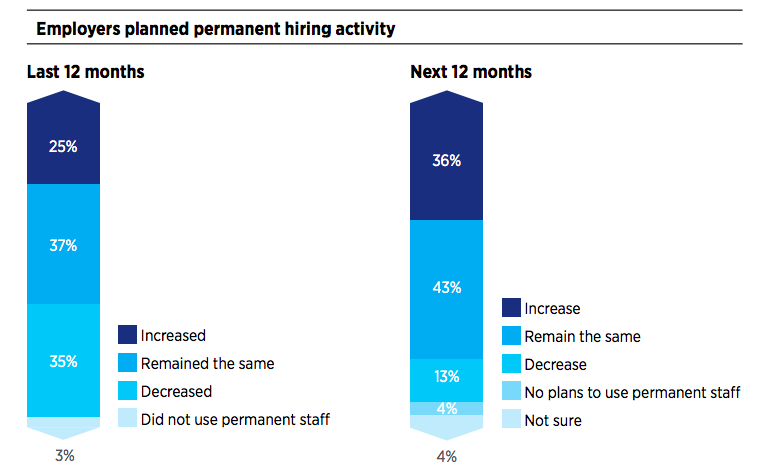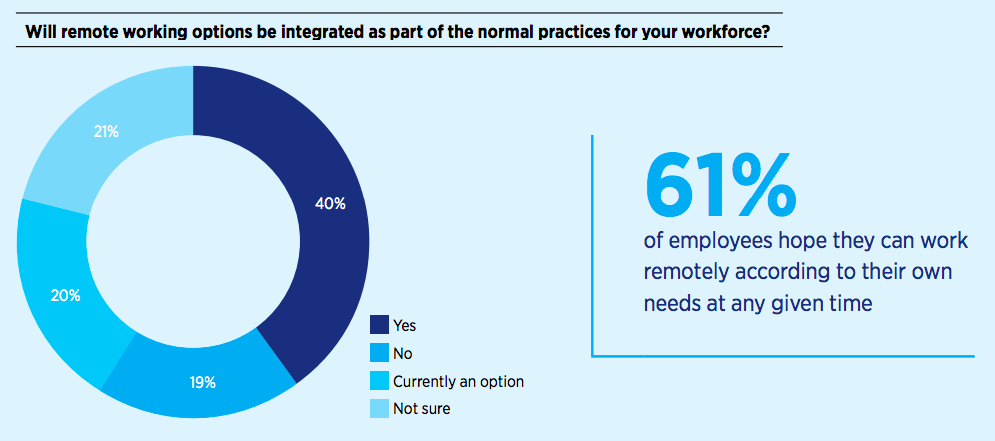According to Hays’ 11th annual salary guide, a majority of employers are confident in the economy and optimistic about the future Canadian employment outlook. But this take is not shared by their teams!
The lack of social interaction (45%), isolation/loneliness (27%), the increase in workload (25%) and the lack of support for their mental health and well-being are among the preoccupations cited by Canadian employees.
Hays’ report, published on the 21st of October, also reveals that 49% of employees are seriously considering leaving their current role. A 9-point jump since last year!
This number is at its highest in Quebec (54%), followed by Ontario (52%), compared to Alberta and British-Colombia, where it respectively drops to 45% and 41%.
« There is a certain mismatch between employers that try hard to protect the company and employees feeling neglected. I don’t think it is an insurmountable issue, but someone needs to act at some point. It is time for employers and employees to work together », Travis O’Rourke, President, Hays Canada, says.
Note that when asked what they expect from a new role, employees answer :
- Benefits package (53%)
- Career development (44%)
- Work-life balance (40%)
A progressive recovery
Completed last August amidst the pandemic, the 2021 salary guide presents an overview of companies’ future projects and performances, as well as the Canadian working population’s feelings.
With 2020’s last trimester approaching, an encouraging number of companies have declared getting back to their usual business (55%), or are even experiencing growth (19%), after several slow months, due to the pandemic.

Moreover, 71% of Canadian employers are optimistic about the future Canadian employment outlook. A number reaching 76% in Quebec and Ontario, as opposed to only 50% in Alberta.
The data show that the Canadian workforce has weathered the storm, even if their spirit has been impacted. At the beginning of the year, 81% of employees had cited a « positive » overall wellbeing. However, throughout the lockdown, this percentage has dropped by approximately 20 points, and is now only 64%.
An even more concerning number is that half (54%) of the surveyed employers admit not doing anything for the well-being and the mental health of their employees.
« Canadian employers have an uphill battle, but the increasing number of employees wanting to quit their current role, even in an uncertain job market, is a big problem », Travis O’Rourke declares. « COVID-19 has left everyone exhausted and, even though many companies are doing better, the workforce is flying a white flag. Employees expect that their companies have their interest at heart and we are finding today that unsupported teams look for better opportunities. These employees will be gone, as soon as the pandemic has taken a turn or once we see other signs of work market vitality. »
Hiring and raises, not really on the agenda
In terms of hiring and salary, the report indicates that a third (35%) of the respondents declared having reduced their personnel and 71% having frozen salaries in response to the pandemic. Instead of reinforcing their teams, they instead expect to recover staff that had been laid off in the last six months.

Only 19% of them predict an annual salary increase greater than the annual change in costs of living, and about a third (19%) have confirmed that no salary increase is expected for the following year. A proportion that reaches up to 46% in Alberta and settles at 33% in Quebec, compared to 23% for Ontario and British-Colombia.
More precisely, in Quebec :
- 18% of the province’s employers are still not sure about which salary raise measures to adopt;
- 16% of employers predict a 1% to 2% raise;
- 27% of employers predict a 3% to 5% raise;
- Only 7% of employers predict a salary raise larger than 5%.
« Employers are battling against the greatest global recession since the Great Depression and, like the nation’s employment numbers show, they are primarily focused on rehiring and retaking lost ground », O’Rourke adds. « It is good to see we are on the right track but it is clear that things like salary raises, employee training and well-being expenses could be put on the back burner for a while. »
Teleworking and its challenges
Often considered as an advantage tied to work, working from home has become the norm since last spring in fields where business can be done outside of a company’s office space.

Hays’ data confirms that employees have adapted to a new regime and a third of them estimate that their productivity has gone up as a consequence.
Moreover, employers had indicated that their confidence in their teleworkers has increased by about 20% in the past months… but cannot confirm the gain in productivity observed by their workforce.
Hays’ experts find that this is due to workers wanting to be more productive but work conditions being impacted by more time-consuming daily tasks.
Different issues between employees and employers
More precisely, 41% of Canadian employers declared that their greatest challenge with teleworking is to maintain their employees’ motivation and engagement. Quebec has distinguished itself with a figure of 59%!
In the province, challenges are :
- Technology and system related issues for 41%;
- Maintaining efficient communication (41%);
- But also maintaining productivity and efficiency (35%);
- And the integration of newly hired employees (35%).
For 31% of employees, the biggest challenge while working from home is disconnecting after work hours, followed by lack of efficient communication with colleagues, clients or stakeholders (18%) and the managing of household distractions (16%).
Also, 41% of surveyed Quebecers stated not having difficulties working from home (as opposed to 29% in the rest of the country).
« We have to remind ourselves that the way we work and live in general has changed in a spectacular manner and that former rules of work-life balance have disappeared, O’Rourke adds. It also isn’t the type of challenge that should be put on employers. Of course, your boss can create flexible work hours or open holiday policies, but companies that do it best are the ones that give their employees the means to find structure that suits their lifestyle. »




